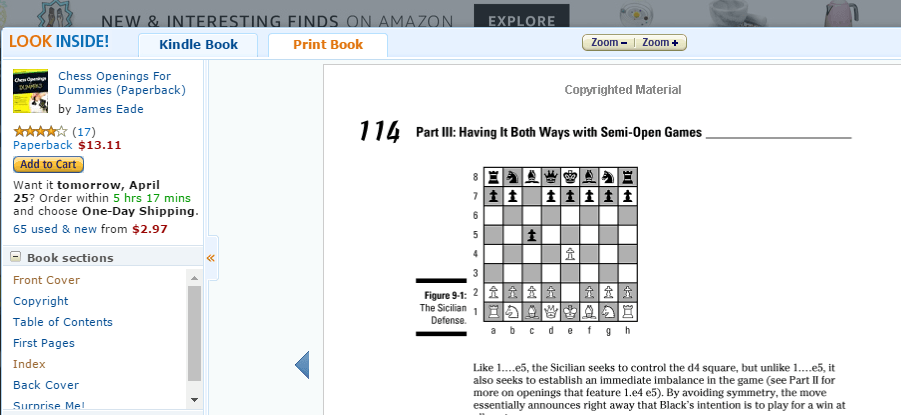I recently got Chess Master vs Chess Amateur by Euwe for my Kindle. Looks very interesting. The book is in English descriptive notation, but I usefully found a PGN of the book online so that helps some.
Good chess books for beginners and beyond
I recently got Chess Master vs Chess Amateur by Euwe for my Kindle. Looks very interesting. The book is in English descriptive notation, but I usefully found a PGN of the book online so that helps some.
Another "oldie but goodie"! My previous remarks regarding Dr. Max Euwe's books apply. On top of being World Champion, he was one of the best writers of introductory chess books in his time.
For absolute beginners at tactics, Bruce Pandolfini, Beginning Chess and this eBook by a class player https://www.amazon.com/Essential-Tactics-Building-Foundation-Chess-ebook/dp/B06XKG1VZD
Both of these books have composed exercises with no more than ten pieces. These simple positions teach basic pattern recognition.
The Polgar brick (Chess in 5334 Positions) offers the same sort of pattern recognition for checkmates.
In my 3rd year of high school I had a friend come over to the school club. He wondered what this game was. We told him it was chess. We taught him the moves as it was simple enough. Being the higher noobs we were at the time, we would beat him with opening traps. At first, he didn't mind the losses, but it was more like the bantering verbal abuse club with a lot of trash talk flying around. The next couple of months he sought help to improve his game. We didn't see him for a while as he was not on the team. The school year was near its end and we saw come to the club again. He had 3 books with him and was "lecturing" us on how important the endgame was. Again, the noobs we were back then retorted "Well how could you beat us in the end game when we get you in the opening?" The three books he had: 100 Selected Games by Botvinnik, Chess Endings by Fine, and 1001 Sacrifices and Combinations by Reinfeld. Low and behold, our cheap parlour opening traps did not work on him like before. When it came to it, the traps we set were left unsprung and put our pieces in a weak position. He then proceeded to take over the game with his tactical sight as we began make random weak moves without a plan. The next year my friend became Board 1 for our team. And he advanced on just reading those three books alone - from beginner to C-class. And then he got stronger by seeking out tougher competition. He didn't care that he lost. He cared only to find his weaknesses and eliminate them. His chess growth was faster than anyone else's on the team. He studied tactics and endgame. The only thing about the opening he cared about was that his pieces were quickly developed. He didn't care much for opening theory and his tactical eye would prevent him from making a bad move at the very least.
But that was more than 30 years ago. Still, I think the formula holds water for most of us - it is all in technique when it comes down to the bare bones. Use the books you already have. Read them from cover to cover. There is always something a chess book offers each time you read one.
You can check out a free Chess University lesson for beginners here:
https://www.chess.com/blog/GeniusKJ/provoking-targets-free-lesson-2
The Complete Spanish
by A.S. Suetin
Really? I have that relic, and I don't know who it would benefit. It wasn't a great book even when it was published.
Perhaps, a modern near-beginner could try The Ruy Lopez: Move by Move by Neil McDonald (2011)
https://web.archive.org/web/20140627022042/http://www.chesscafe.com/text/hansen153.pdf
or Starting Out: Ruy Lopez by John Shaw (2003).
https://web.archive.org/web/20140627024240/http://www.chesscafe.com/text/hansen53.pdf
Judit Polgar's teaching book is also good.
https://www.amazon.com/Fischers-Record-Judit-Polgar-Teaches/product-reviews/1907982191/ref=cm_cr_dp_d_show_all_btm?ie=UTF8&reviewerType=avp_only_reviews&sortBy=recent
Yes, an outstanding book.
"How I Beat Fischer's Record" by Judit Polgar
It's in my list as well.....
A nice article about Judit Polgar's chess career -
http://en.chessbase.com/post/judit-polgar-the-greatest-prodigy-ever
Would either "Winning Chess Openings" or "Play Winning Chess" by Yasser be appropriate for a virtual news such as myself?
Yes. Yasser Seirawan's "Winning Chess" series of books are all generally very good for beginners and beyond...
Would either "Winning Chess Openings" or "Play Winning Chess" by Yasser be appropriate for a virtual news such as myself?
http://seagaard.dk/review/eng/bo_beginner/ev_winning_chess.asp?KATID=BO&ID=BO-Beginner
https://web.archive.org/web/20140627132508/http://www.chesscafe.com/text/hansen173.pdf
Does anyone know if the book Chess Openings for Dummies uses examples that show the numbers and letters on the borders?
Yes, it does.
https://www.amazon.com/Chess-Openings-Dummies-James-Eade/dp/047060364X
Take a look inside.
Yes, it does.
https://www.amazon.com/Chess-Openings-Dummies-James-Eade/dp/047060364X
Take a look inside.
Are you seeing any pictures of boards? I took a look inside and don't see any examples of little boards with numbers and letters around them. It's exactly the same as amazon.ca's "look inside" example.
5334 Combinations Problems, and Games, by Polgar.
That is all you need.
That's a great book. I wish I hadn't given my copy away (when I thought I was finished playing chess).
5334 Combinations Problems, and Games, by Polgar.
That is all you need.
That's a great book. I wish I hadn't given my copy away (when I thought I was finished playing chess).
I've had my print copy nearly 20 years, but last week I bought the Kindle edition for $2.99. Now, i can read it on my phone.

I don't know if anyone has mentioned it yet, but "Judgement and Planning in Chess" by Dr. Max Euwe (a former world champion) was an excellent book-however the last I saw it was in descriptive notation. Still an excellent book.
Yes. "Judgement and Planning in Chess" was, and is, an instructive middle game, positional chess tutorial from back in the day. Still in descriptive notation though. Dr. Max Euwe's chess books were/are very good - even if now somewhat dated.